Main Menu
- EnvironmentHealth
Main Menu
- EnvironmentHealth

Soul Music: How Art Heals is a documentary project that explores how music and other arts can help sick or dependent people feel better*, a statement that has become particularly relevant during the isolation of the pandemic. The project features personal stories from more than 25 healthcare environments (hospitals, nursing homes, mental health centers, home care, etc.) in six cities in Spain throughout 2021.
Many of the hospitals and healthcare centers ended the recreational activities they used to host due to the pandemic. On March 1st, 2021, the Zendal Hospital in Madrid, for COVID-19 patients only, made an exception and authorized a micro-concert held by Músicos por la Salud Foundation. The experience was so positive for patients and staff that they held more than 100 concerts.
Prolonged quarantines, uncertainty, and fear have led to the deterioration of many people’s mental health. Aware of the need to mitigate the effects of isolation, healthcare facilities have gradually increased these face-to-face activities and facilitated access to non-pharmacological treatments, such as music therapy or art therapy, to lift the spirits of patients and residents and promote a sense of well-being that goes far beyond the current pandemic.
** The project is supported by the National Geographic Society’s COVID-19 Emergency Fund for Journalists.


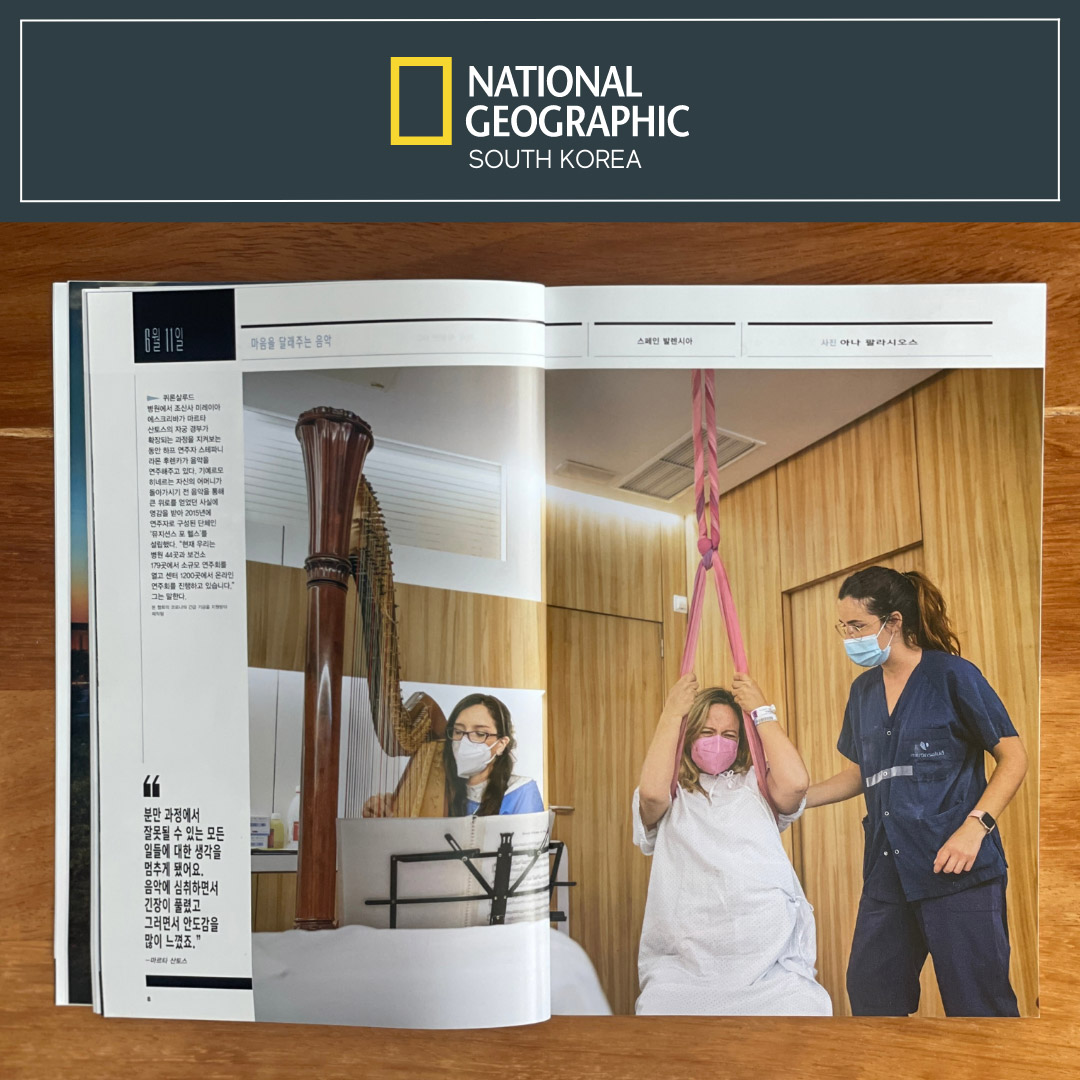
National Geographic Korea. January, 2022
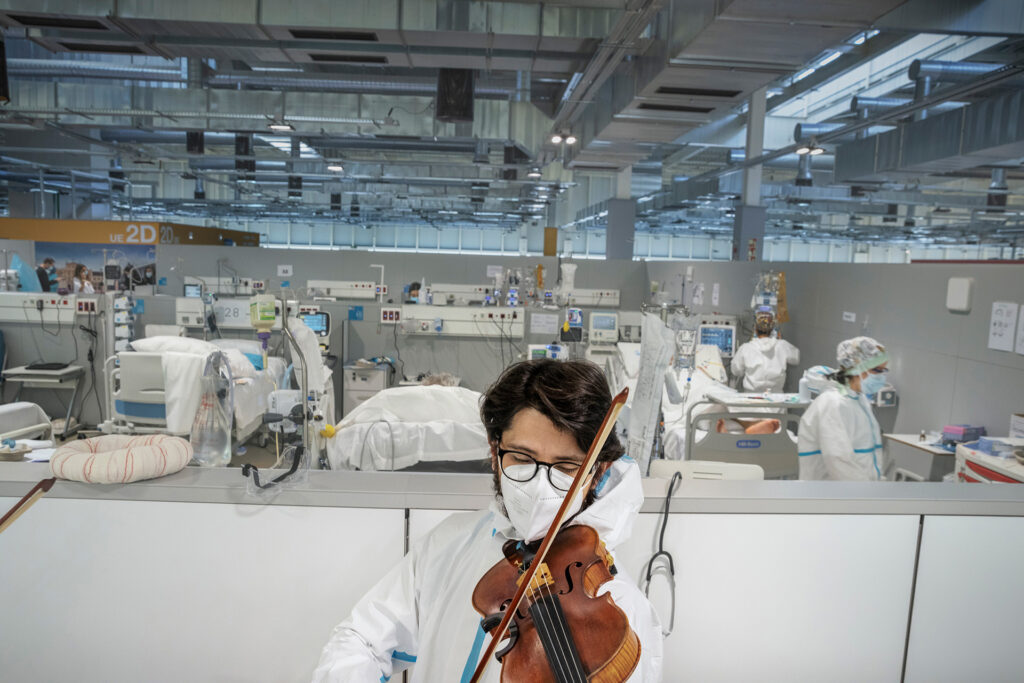
Violinist and orchestra conductor Albert Skuratov plays Mozart pieces for patients in the Intensive Care Unit at Nurse Isabel Zendal Emergency Hospital. Albert is a volunteer with Fundación Músicos por la Salud [“Musicians for Health”], a foundation that organizes micro-concerts to “humanize” people’s experience of healthcare through music, offering moments of wellbeing to patients, residents, attendants, and staff in hospitals, social and healthcare centers, and facilities that cater to the needs of vulnerable populations. This hospital was built during the pandemic as a center dedicated exclusively to COVID-19 patients to help relieve the burden on other hospitals so that they could admit patients with other pathologies.

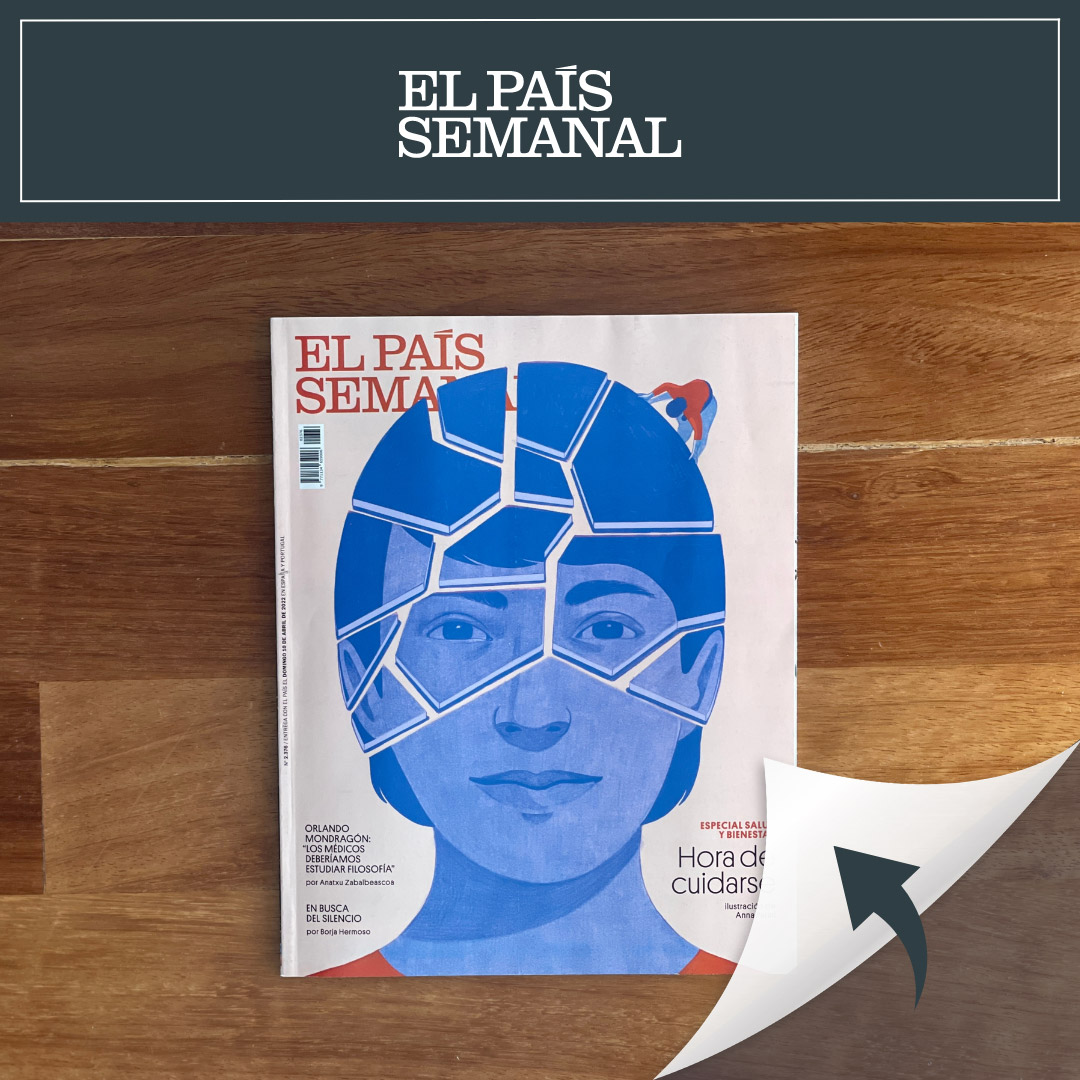

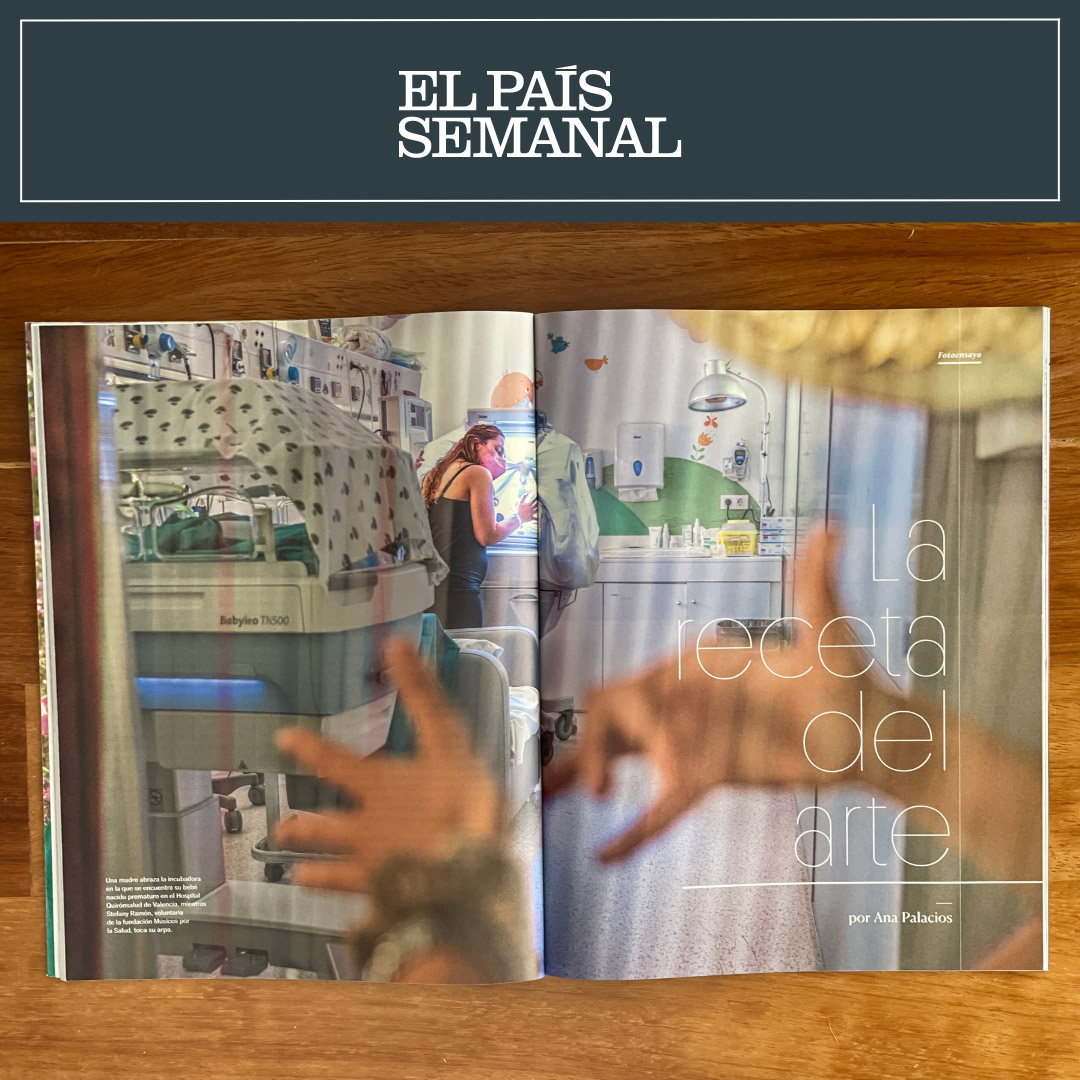
El País Semanal – La receta del arte. April 2022
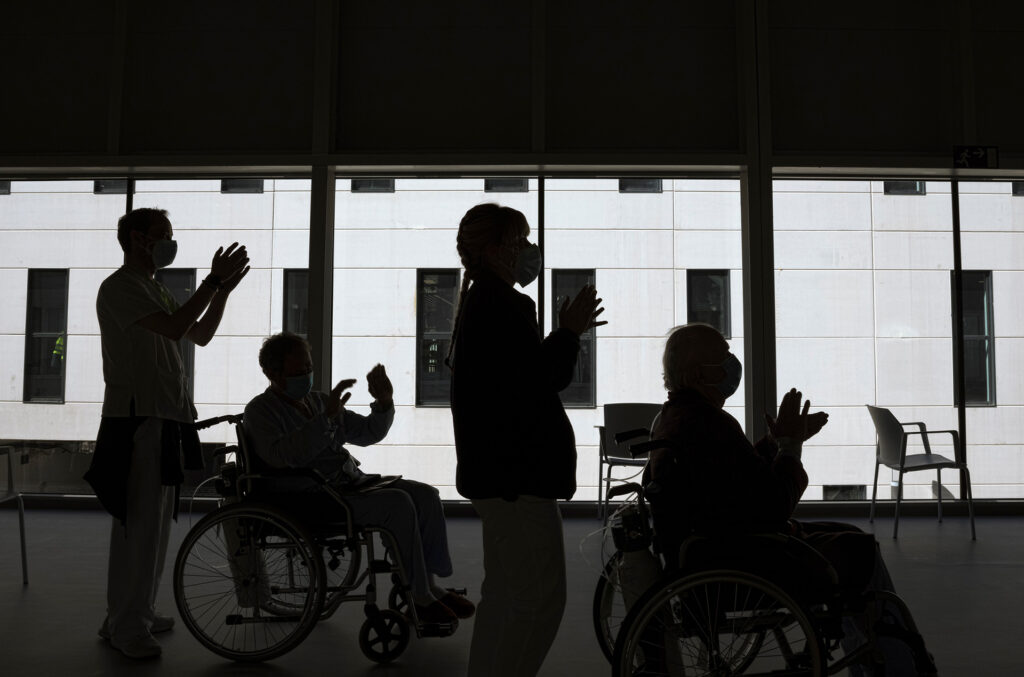
Patients and healthcare workers listen to the daily micro-concert organized by Músicos por la Salud in one of the corridors at Nurse Isabel Zendal Emergency Hospital in Madrid. Sometimes when healthcare staff are transferring patients who are feeling better from the Critical Care Unit, they’ll ask for permission to attend the event and take them over to Pavilion 1 where the concerts are held.
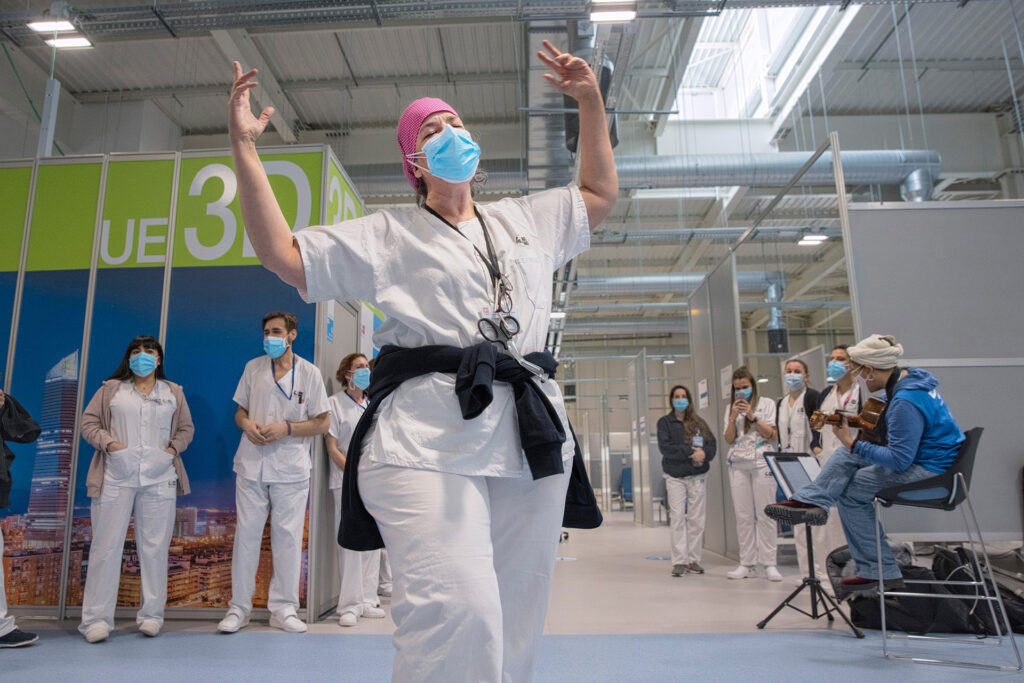
Dozens of healthcare workers wait for the doors of Nurse Isabel Zendal Emergency Hospital to open before the second day of a mass vaccination campaign against COVID-19. During the wait, Katia Márquez, an artist collaborating with Músicos por la Salud, plays the song “Color Esperanza” (“The Color of Hope”) on her guitar. Susana Martín is deeply moved and comes out to the middle of the corridor to dance.
Zendal Hospital started a mass vaccination campaign the day before this photo was taken. On June 28, 2021, the hospital became a 24-hour COVID-19 vaccination center.
“Those half-hour concerts were fun. I really enjoyed them. The patients looked forward to them, and their moods changed.”
Cristina García Torres, radio-diagnosis technician at the Zendal Hospital.
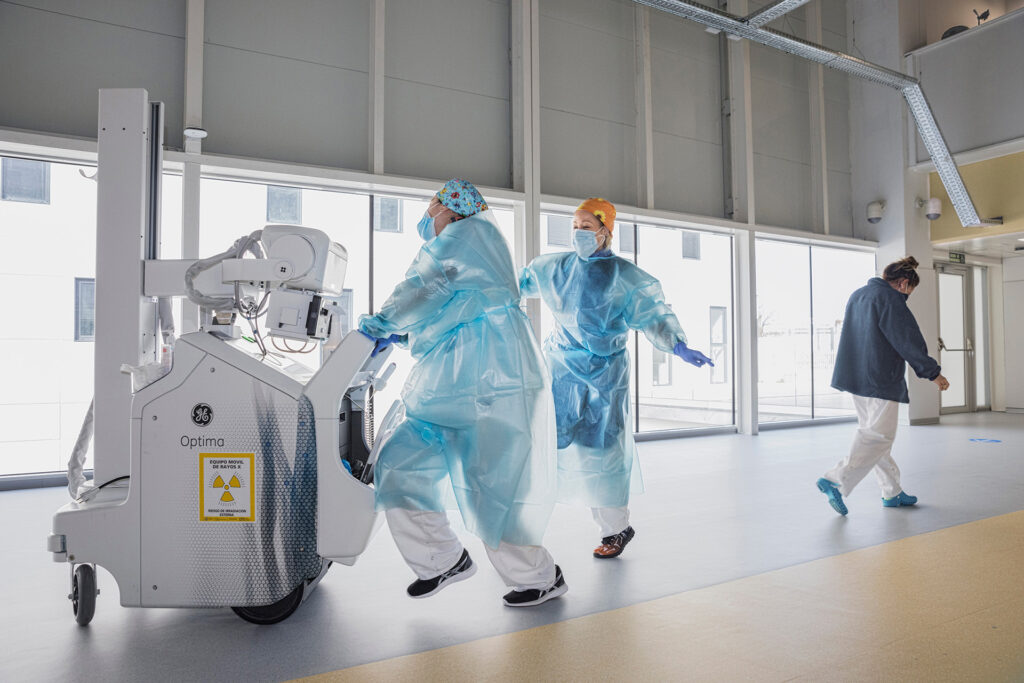
Radio-diagnosis technicians Cristina García (left) and Pilar Mingo (right) cart a portable X-ray machine over to a patient in the Critical Care Unit who is not well enough to make his way to the Radiology Department. To get to him, the technicians have to walk through the “recess corridor” just as performer Katia Aznar is playing rumbas on the upstairs floor during a recital organized by Fundación Músicos por la Salud to entertain patients and healthcare staff.
“Those half-hour concerts were fun. I really enjoyed them. The patients looked forward to them, and their moods changed.” Cristina García Torres, radio-diagnosis technician at the Zendal Hospital.

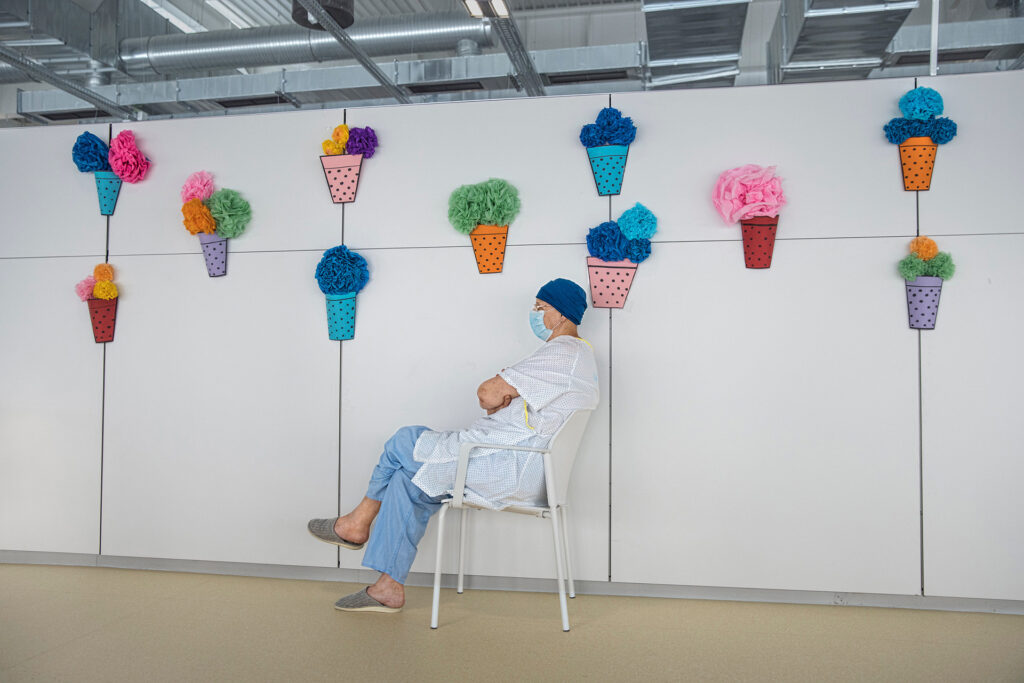
R.G.V. listens attentively to author Javier Moro amidst the paper plants decorations used to add color to the hospital environment and lift patients’ spirits in celebration of the April Fair.
On April 23, 2021, International Book Day, author Javier Moro explained how he went about doing research to write the novel A Flor de Piel to COVID-19 patients at Nurse Isabel Zendal Emergency Hospital, which takes its name from the historical figure who is the book’s protagonist. The activity organized by Ana María Soria, the nurse in charge of the Hospital’s humanization service, consisted of having patients and healthcare staff read various passages. Participants were given a copy of the book and a flower as gifts.
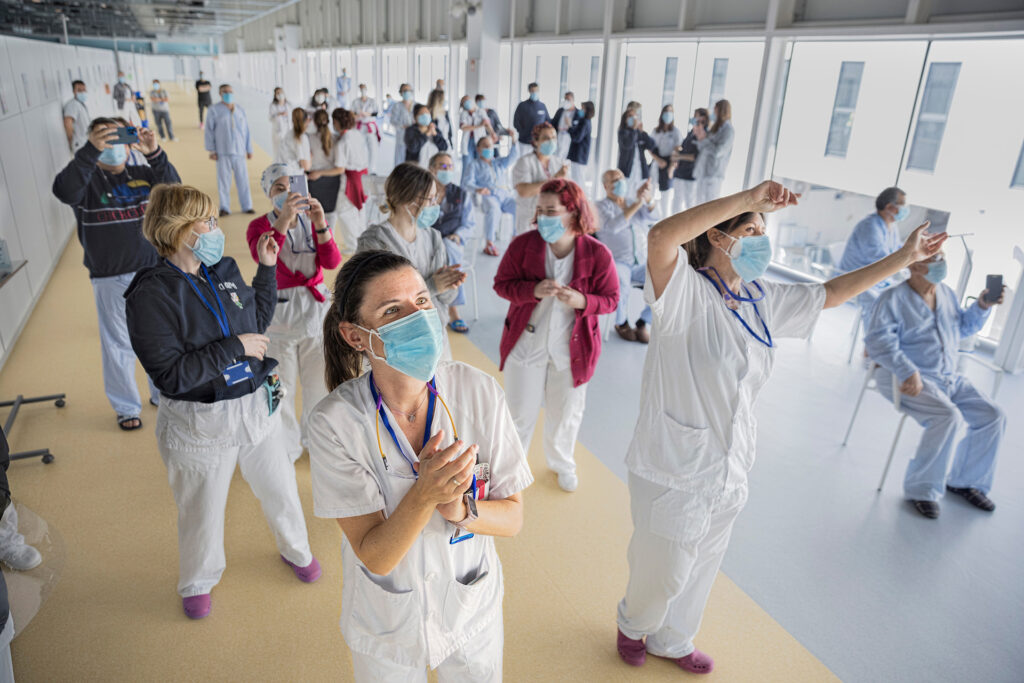
Singer Raúl gave a concert organized by Fundación Músicos por la Salud that created much expectation among patients and healthcare workers. It was a very special day at the hospital, and the concert had what was possibly the highest turnout of all 119 recitals held at the hospital in 2021.
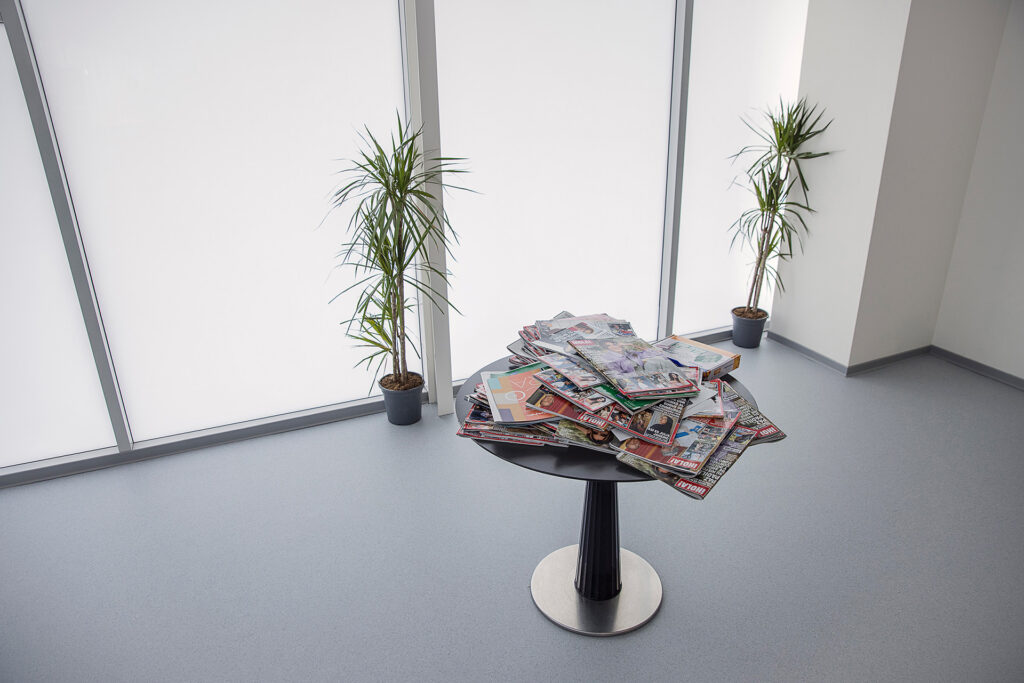
The library at Isabel Zendal Emergency Hospital is stocked thanks to donations from private individuals and institutions, including cultural centers, city councils, fire stations, libraries, some authors, etc. Every week, the library receives magazines and books that are reviewed, classified, and made available to patients. There is a high demand for novels, though some patients prefer poetry and others like puzzles. They also had to find a Bible upon special request from a patient.
The books are displayed along the corridors where patients’ can walk around. Initially, they were laid out on tables and chairs, but, eventually, they were organized on shelves. If a patient is unable to walk around, they can have books delivered to them. The books are rotated among the different locations every week. In addition to books, the library also includes board games.
With support from the library at Clínico San Carlos Hospital, this library is now part of the Hospital Library Network.
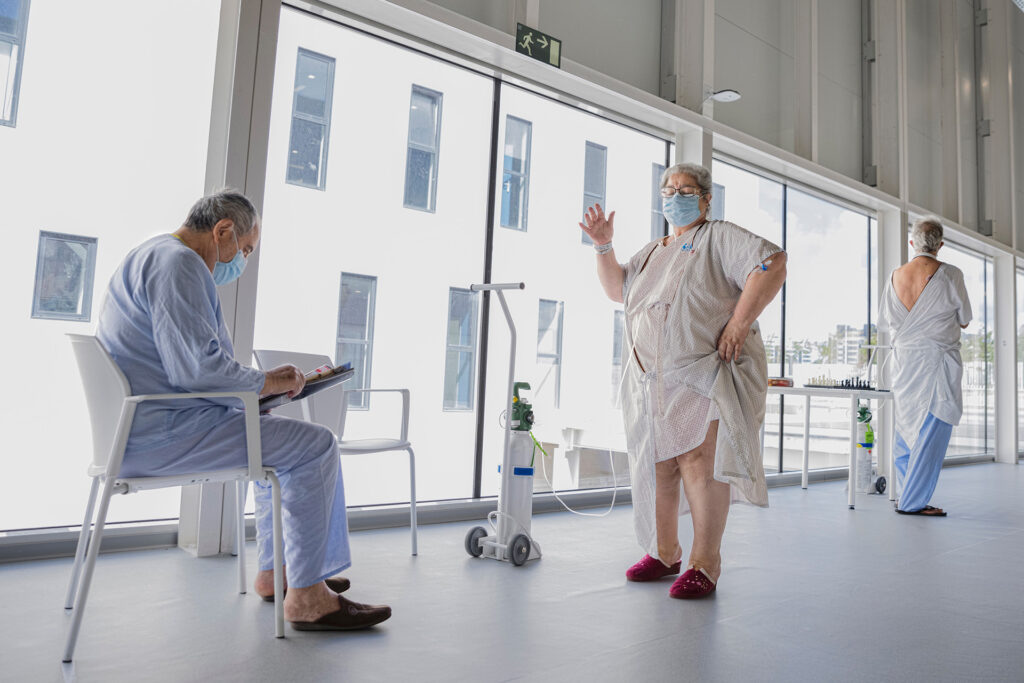
María Jesús Polo Manso dances to the rhythm of the music played by Katia Márquez during the half-hour micro-concert Fundación Músicos por la Salud offers patients and healthcare personnel every day at 11:00 a.m. in the so-called “recess corridor” in Pavilion 1 of Nurse Isabel Zendal Emergency Hospital, dedicated exclusively to looking after COVID-19 patients.
“Músicos por la Salud has marked a turning point in my life because it’s given me the chance to vibe and use song to make other hearts that need harmony and strength vibe too.” Katia Márquez, Cuban artist and composer based in Madrid.
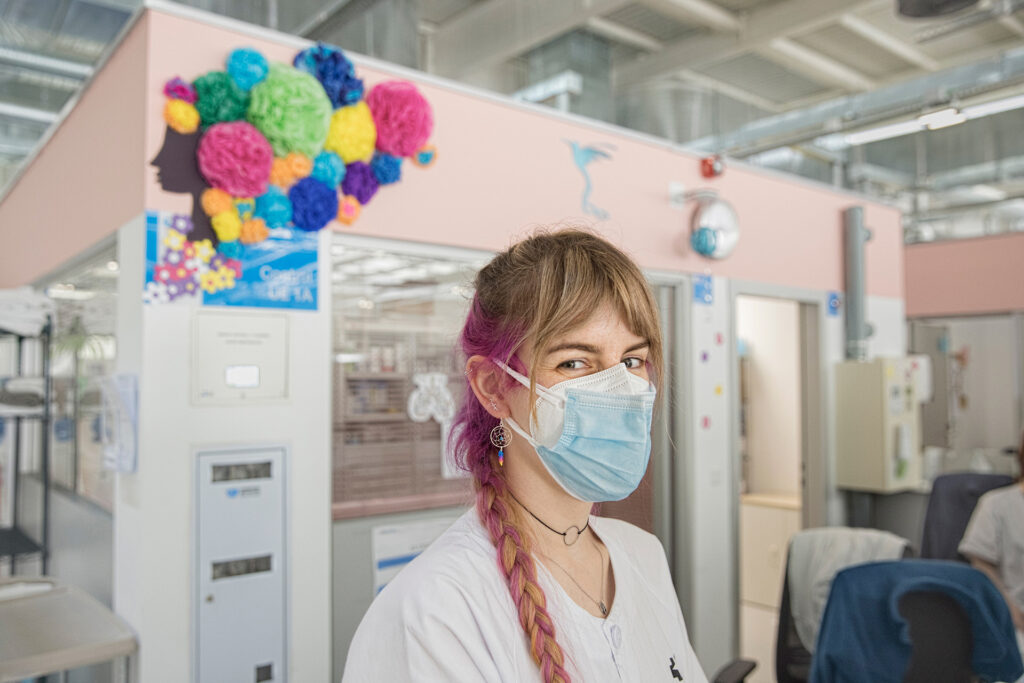
“We were the first to decorate the hospital. We did it secretly, during the night, when things are normally a bit quieter. At night, it’s time for patients to rest, and during that time we would cut out hearts and flowers to stick them up all over the ward, adding messages of love.
I’m very happy to come to work. It’s exciting because these types of activities help you reconnect with your profession. Nursing is a profession that requires a huge sense of empathy and compassion, and with these types of activities you know you’re supporting patients’ mental health because you’re helping to make their stay at the hospital more pleasant and leaving them with a fond memory of their confinement. Let’s not forget that the patients are isolated. Their families can’t come visit them, because they’re infected, and no one can come in from the outside to see them.” Galaxia Sacristán, a nurse at Zendal Hospital.
The Community of Madrid’s Nurse Isabel Zendal Emergency Hospital was built in 100 days. It opened its doors on December 13, 2020, to help relieve the pressure on the Community of Madrid’s network of hospitals. The Zendal has a capacity of up to 1,000 hospital beds.
Once the hospital was built, there was an urgent need to hire all the staff required to meet the hospital’s needs and, within a few days, dozens of work teams were formed with healthcare workers who had never met before, most of whom were very young. “We have enough staff, and the teams are full of energy and enthusiasm. We get along really well, and that makes it easy to organize these humanization activities,” says Galaxia Sacristán, a nurse at the hospital.
The hospital’s staff is flexible. It fluctuates depending on patient occupancy and has grown to include as many as 800 workers.
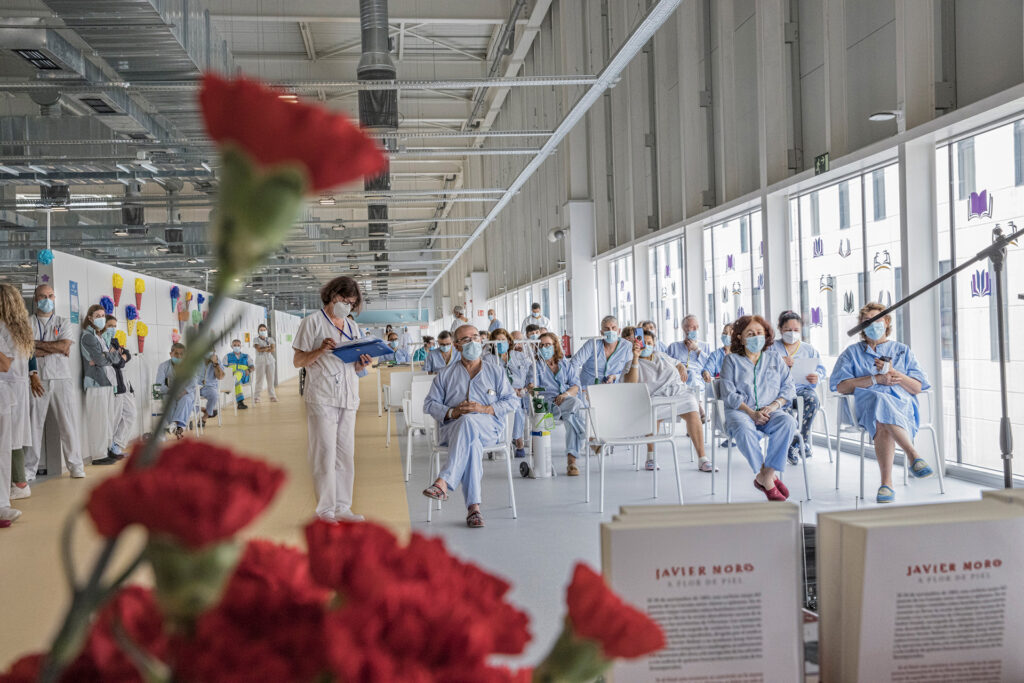
Ana María Soria, Humanization Activities Supervisor at Nurse Isabel Zendal Emergency Hospital (pictured here in the middle), organized a recreational event at the hospital to celebrate International Book Day, April 23, 2021. Various patients and healthcare workers read passages from the historical novel A Flor de Piel. The hospital is named after the book’s protagonist, the nurse Isabel Zendal. The event was attended by the book’s author, the writer Javier Moro, who signed copies for everyone participating in the reading, who were also given a flower.
“The initiative was inspired by the traditional annual reading of Don Quixote organized at the hospital where I normally work and, of course, it was made possible with support from the nursing department. Verónica Real, Director of Nursing, knew the writer Javier Moro and invited him to the Zendal one day, and we talked about the possibility of organizing a similar event. He was delighted to accept, and it was very interesting to hear him tell us in person how he researched and wrote the book. We handed out 40 autographed books. We also received a donation of flowers, which we were able to give to more patients, even if they did not participate in the reading.” Ana María Soria, nurse and Humanization Supervisor at Zendal Hospital.
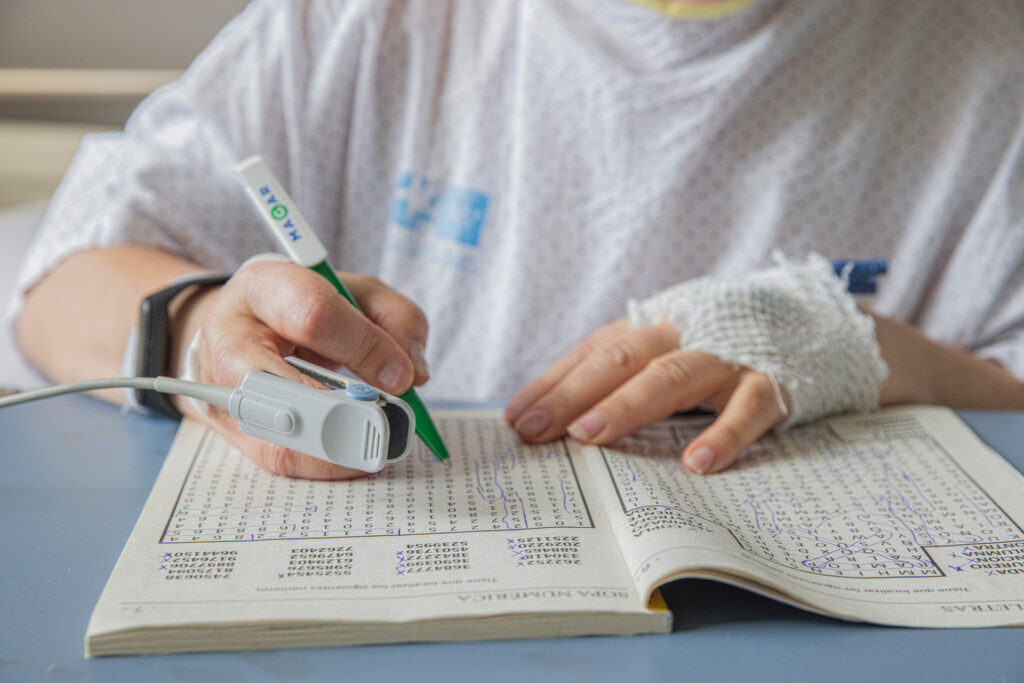
Mari Carmen Rubio and her husband are hospitalized with the British variant of the coronavirus in the Pulmonology Pavilion at Gregorio Marañón Hospital. The two share a room while their son Adrián, also hospitalized, occupies the room next door. Because they are a family unit, the hospital did everything possible to keep them together throughout their hospitalization to make the disease easier to bear emotionally.
Humanization is a key part of at Gregorio Marañón Hospital’s strategy for making patients’ experience in the healthcare environment as pleasant as possible.
The measures taken are varied and apply to the entire hospitalization experience, ranging from installing audiometers to control the noise level on hospital floors or hanging clocks and calendars in the Geriatric Pavilion to prevent the elderly from becoming losing track of time.
To help hospitalized patients stay in touch with the outside world, the hospital celebrates special days like Book Day, Hospitalized Children’s Day, and every holiday in the Christmas season, including a Three Kings’ parade for hospitalized children and older adults. We also collaborate with numerous institutions to organize brief concerts at Outpatient Services where patients go to get treatments, we offer makeup workshops for women with cancer, and we have a support program with clowns for children who are undergoing surgery.
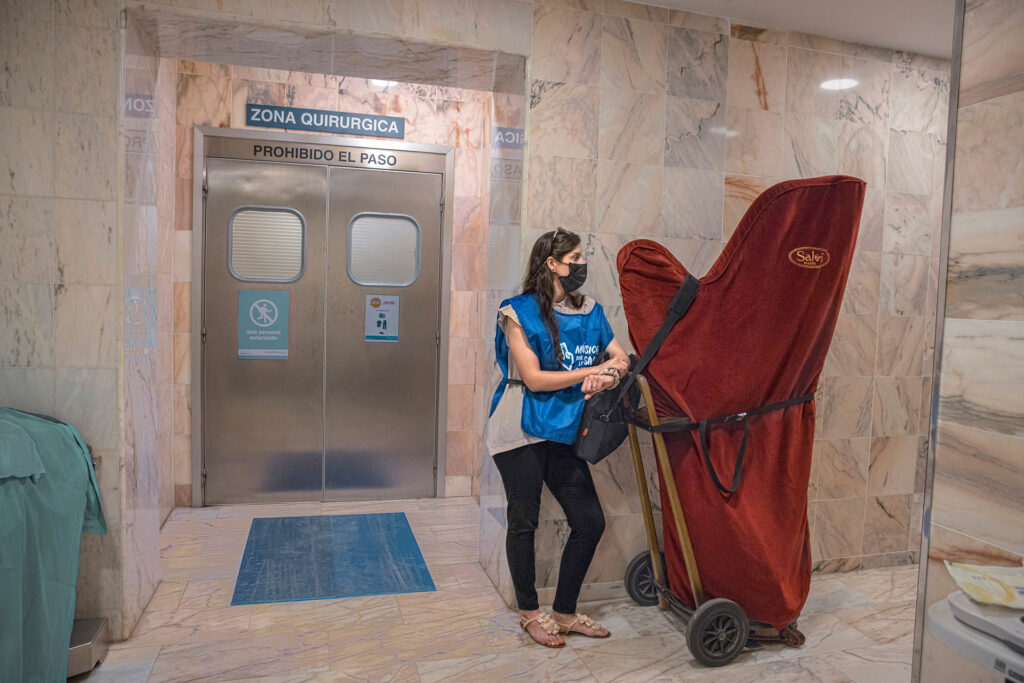
This is the first time Stefany has done this type of volunteer activity, coming in with her harp to accompany patients at Quironsalud Hospital in Valencia and play music for them.
“Being surrounded by doctors and in an environment that is so different from what I am used to was very special and it also made me a little nervous at first. Then, as I got to know different patients, I realized that I made them feel better, and that was touching and made me feel better.” Stefany Ramón Jurenka, a harpist, volunteering.
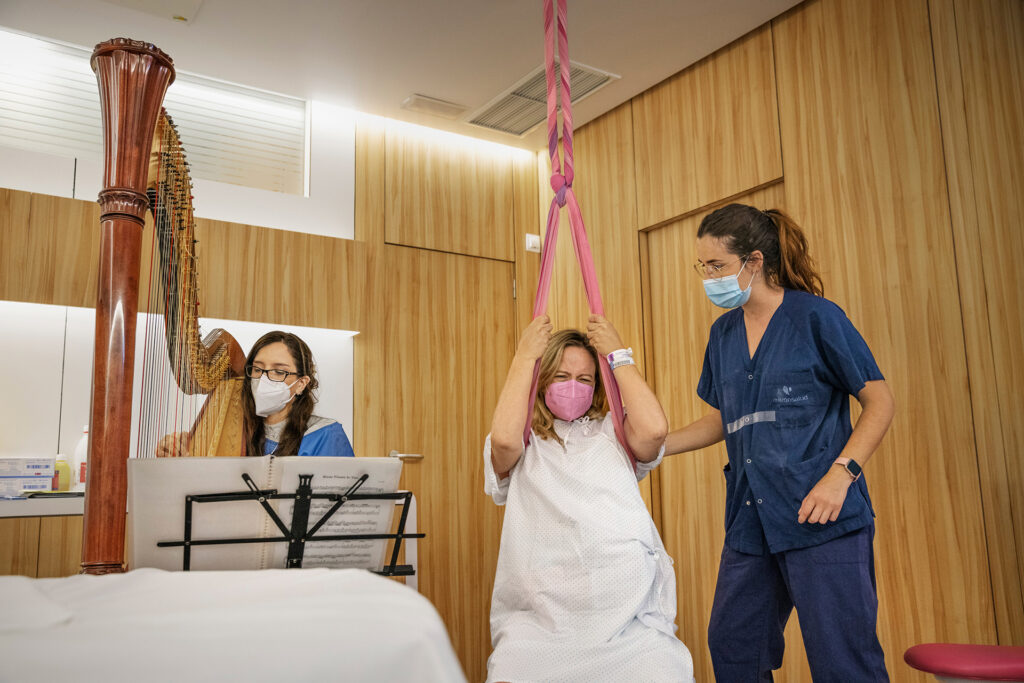
Harpist, Stefany Ramón Jurenka, a volunteer with Fundación Músicos por la Salud, plays a piece of music as Marta dilates in preparation for a “respectful delivery” at Quirónsalud Hospital in Valencia.
“Having a harpist playing live in my hospital room made it a very special moment of intimacy, even though we had never seen each other before. Plus, she played a piece that I love “Comptine d`un autre ete – l`apres-midi” by Yann Tiersen from the soundtrack of the movie Amelie. It helped distract me from the worry and fear I felt at that very delicate and important moment for me. I stopped thinking about everything that could go wrong during the delivery and let myself get carried away by the music, and that really helped me relax.” Marta Santos Delgado, baby India’s mother.
National Geographic Korea. January, 2022
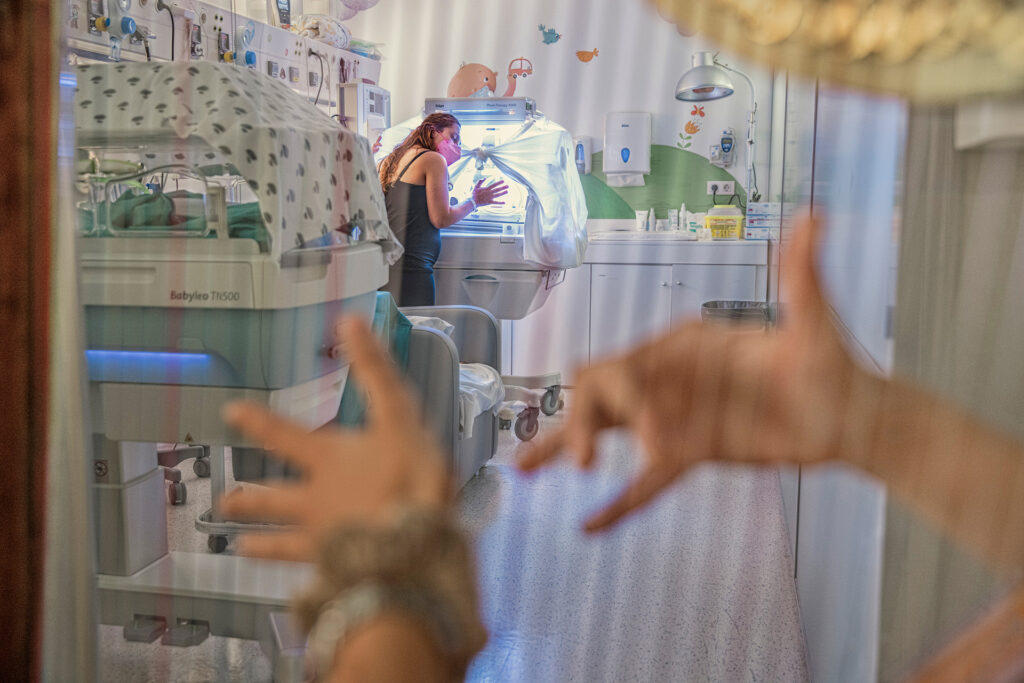
Raquel Romero Martinez hugs the incubator that holds her prematurely born baby at Quironsalud Hospital in Valencia, while Stefany plays her harp.
“I really enjoyed seeing the look in her eyes, it was pure, sincere and unwavering love. That reminded me of the love people feel for their passion, for instance, a musician’s love of music. It’s a love to last a lifetime. Music isn’t a hobby to which you dedicate your spare time, it’s something that is part of your professional and also your personal life, the sort of commitment you might have with a child. The love we feel for our instruments is, in a way, like the love one feels for one’s child.” Stefany Ramón Jurenka, a harpist who volunteers with Fundación Músicos por la Salud.
“During the sessions, music is created by the patients themselves with interventions together with the music therapists, as well as for the patients, with therapeutic musical improvisations in line with the objective established for each situation and pathology.”
Ana Alegre Soler is a music therapist who has been working at Dénia Hospital since 2011.
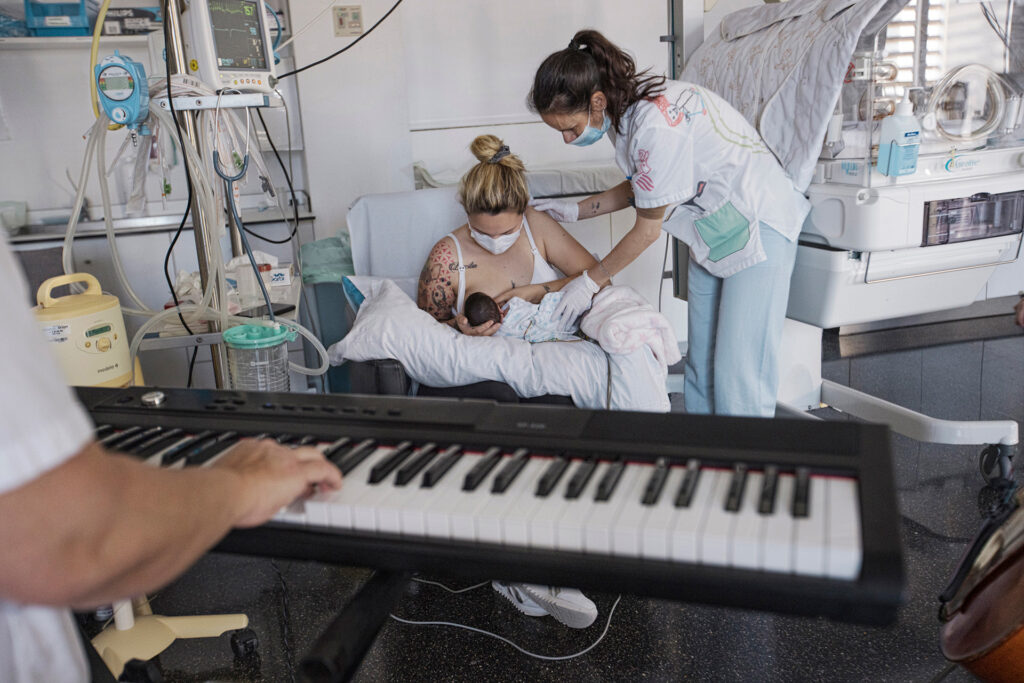
Laila was born prematurely and her mother, Sara, visits her to breastfeed her for the first time at the Neonatal Unit at Dénia Hospital. Ana plays musical pieces to relax the baby and her mother and relieve the stress of this new situation for both of them.
“During the sessions, music is created by the patients themselves with interventions together with the music therapists, as well as for the patients, with therapeutic musical improvisations in line with the objective established for each situation and pathology.” Ana Alegre Soler is a music therapist who has been working at Dénia Hospital since 2011.
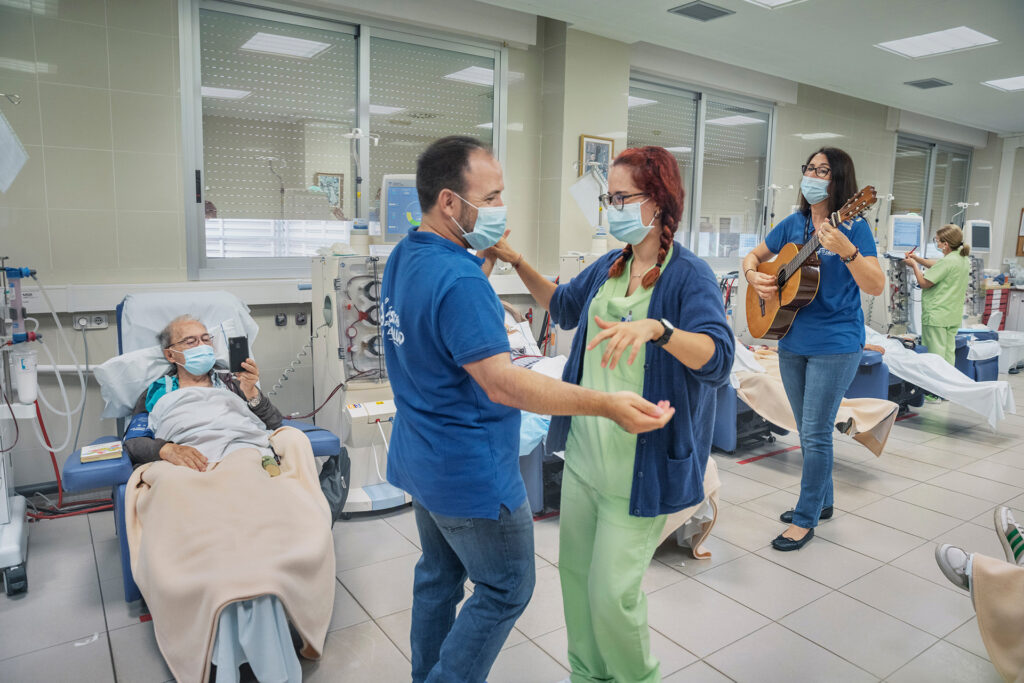
José Silvio Cebrián, 73, records nurse Ana Briz and musician Juanjo Pérez dancing, while Gabriela Castillo sings a bolero to brighten up the morning for hemodialysis patients at La Salud Hospital in Valencia who spend four hours connected to the dialysis machines during each session. Both musicians work with Fundación Músicos por la Salud, a foundation that organizes micro-concerts to “humanize” people’s experience of healthcare through music, offering moments of happiness and wellbeing to patients, residents, companions, and staff at hospitals, social and healthcare facilities, and facilities that attend to the needs of underserved groups.
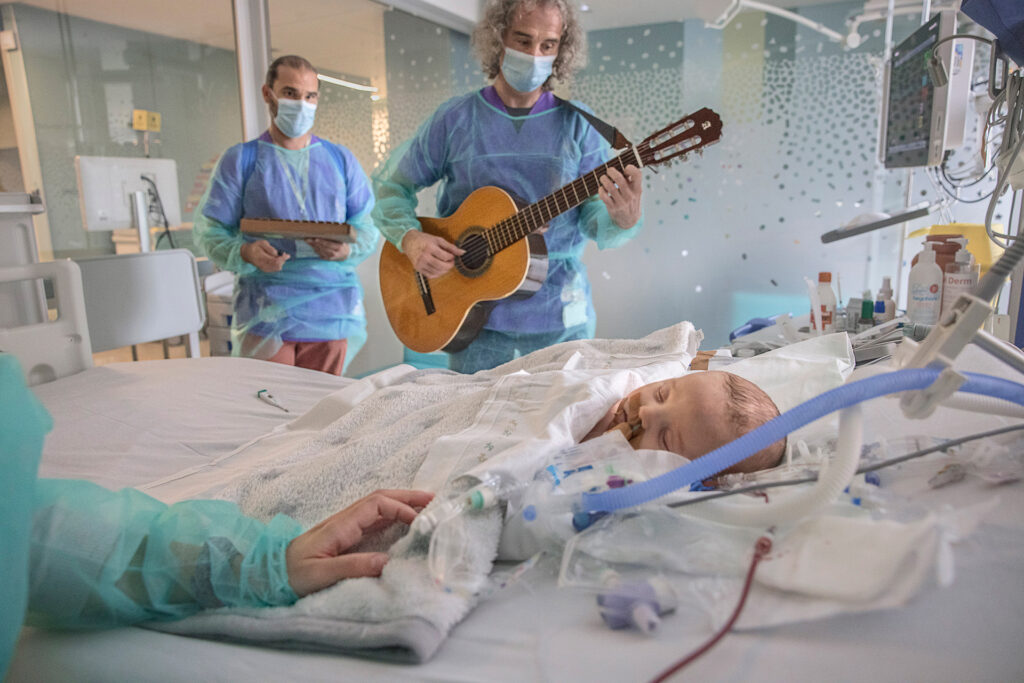
Diana and Nelson accompany their son Danel, admitted due to sepsis and bronchiolitis in the pediatric ICU at Sant Joan de Déu in Barcelona, as music therapists Carles Geli and Raül Hernández sing him a lullaby in Basque.
“One of the most important things about music therapy at the hospital is that we keep them company. In addition to all the contributions we can make to the patient’s life and recovery, it is very important to be able to accompany them and offered a moment of relaxation and distraction, not just for the patient, but also for the parents.” Carles Geli Benito, music therapist with Associació Ressò de Musicoteràpia.
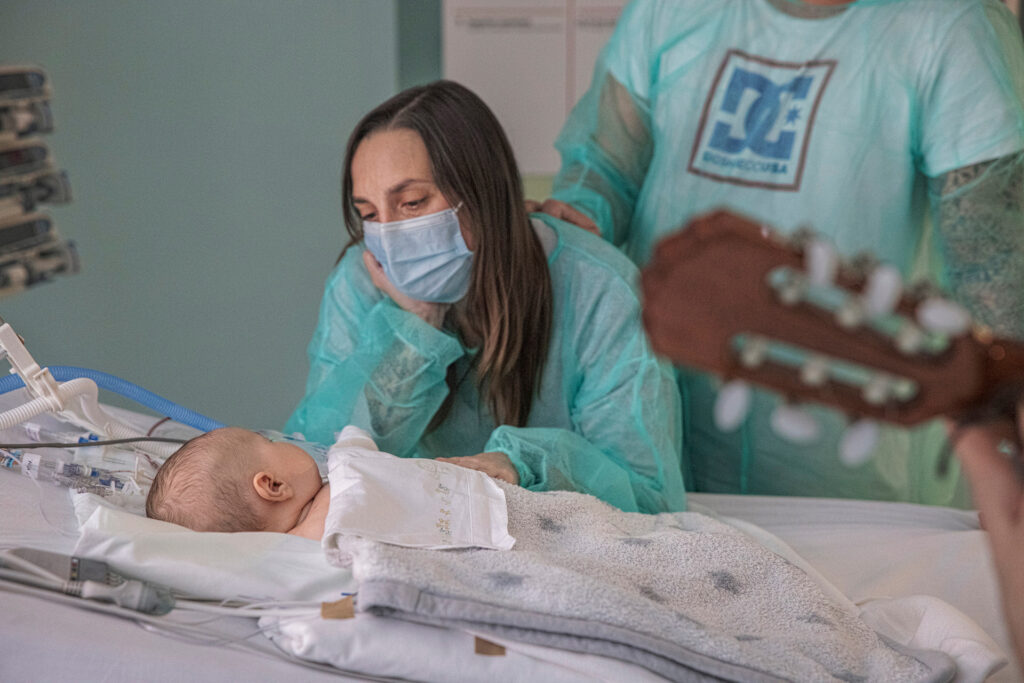
Diana and Nelson accompany their son Danel, admitted due to sepsis and bronchiolitis in the pediatric ICU at Sant Joan de Déu in Barcelona, as music therapists Carles Geli and Raúl Hernández sing him a lullaby in Basque.
“Music created something unique and magical: a moment of peace amidst all the chaos. After many tiring days at the hospital, during which we talked to him without knowing if he could hear us, if our words of love and affection would reach him, that day we finally knew for sure that they could. For the first time in many days, we felt the usual connection with our little one. It’s one of the moments we most cherish from Daniel’s time at the hospital.” Diana Gómez Hernández, Danel’s mother.
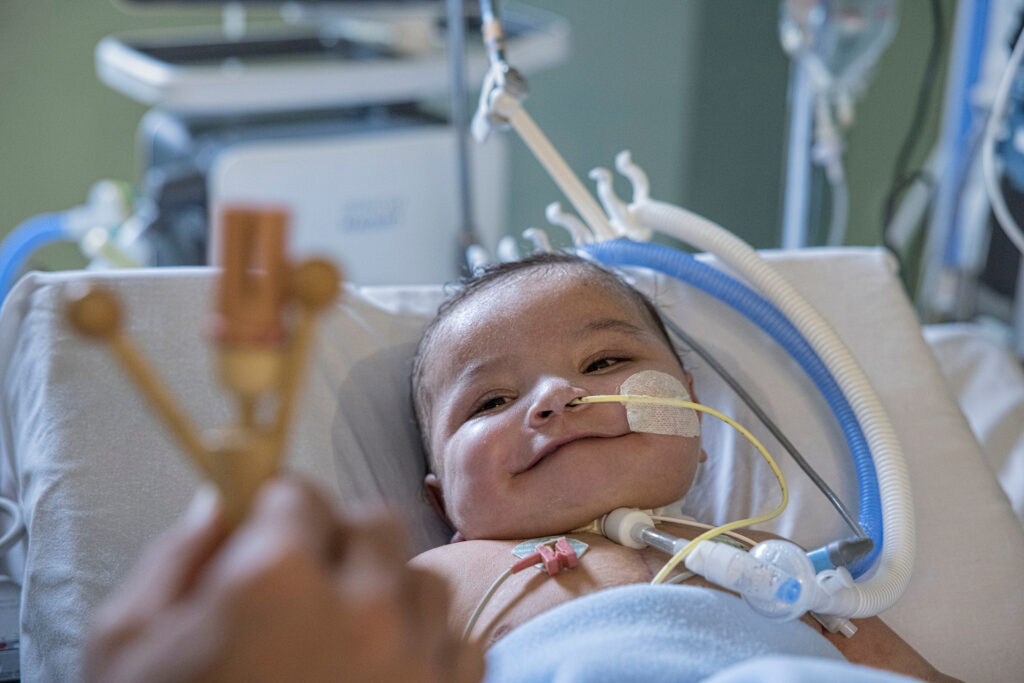
Bruno Cantín was born with only one ventricle and had to undergo heart surgery a few days after birth. At the time this photo was taken, Bruno was recovering in the pediatric ICU at Sant Joan de Déu in Barcelona, while Carles, a music therapist, played children’s songs with different instruments to entertain and stimulate the baby.
“During one of the most complicated situations a family can possibly go through, we can offer moments of normalcy and joy and help children and their families adapt to hospitalization. Through music, a medium that is so dear and natural to me, the room ceases to be a place of suffering, and, for a few moments, it becomes a place of laughter and shared complicity. This work demands that I constantly remain in touch with my sensibility, and, at the same time, it deeply enriches it.”
Pilar Solsona, music therapist with Associació Ressò de Musicoteràpia.
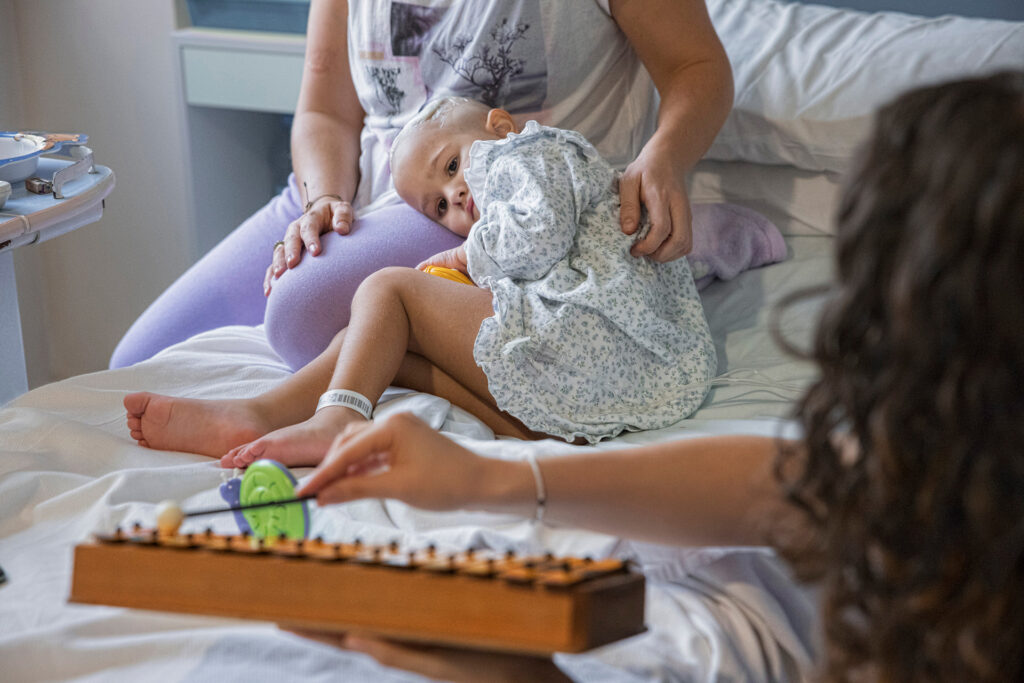
Candela is in pain and is initially reluctant to receive a visit from Pilar Solsona and Núria Aguilera, music therapists who provide support sessions once a week for some of children admitted to the Oncology Pavilion at Sant Joan de Déu in Barcelona, usually those who have been hospitalized the longest. She is serious and upset and takes refuge in her mother, Alicia. After a few minutes, Pilar and Núria start to draw her attention and Candela’s mood improves over the course of the session. The transformative power of music was very revealing when Candela asked them to play the Baby Shark from Pinkfong song and was completely beside herself singing along and totally distracted from everything else around her.
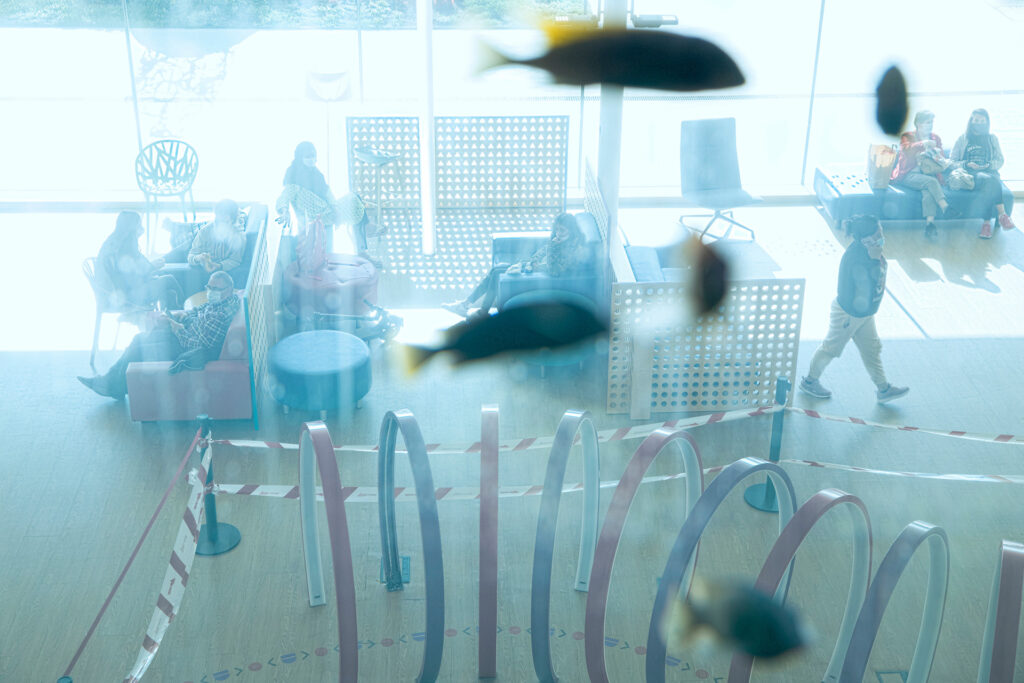
From the second floor of San Juan de Dios Hospital, through the fish tank, you can see the main hall and hear the music played by Rubén Godina, a music student, who is here today as a volunteer for the first time. He is going to play piano at the main entrance of Sant Joan de Déu in Barcelona.
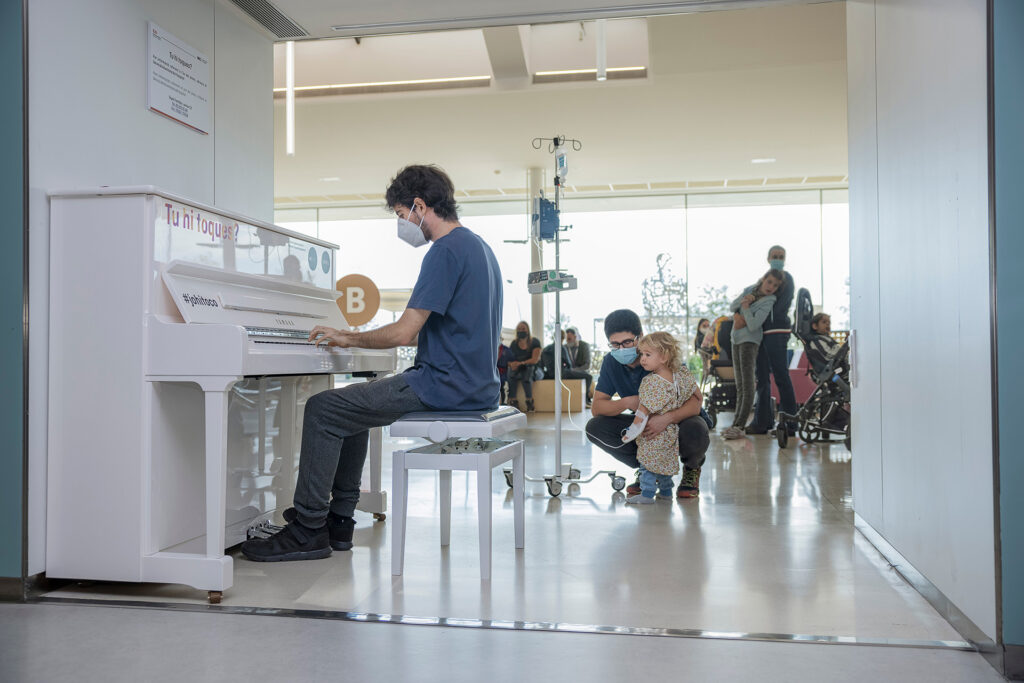
Oriol and his son Guim Múria, who is convalescing from a recent surgery, listen to the music played by Rubén Godina, a music student, on the piano donated by Fundación Maria Canals that has been placed at the main entrance of Sant Joan de Déu in Barcelona.
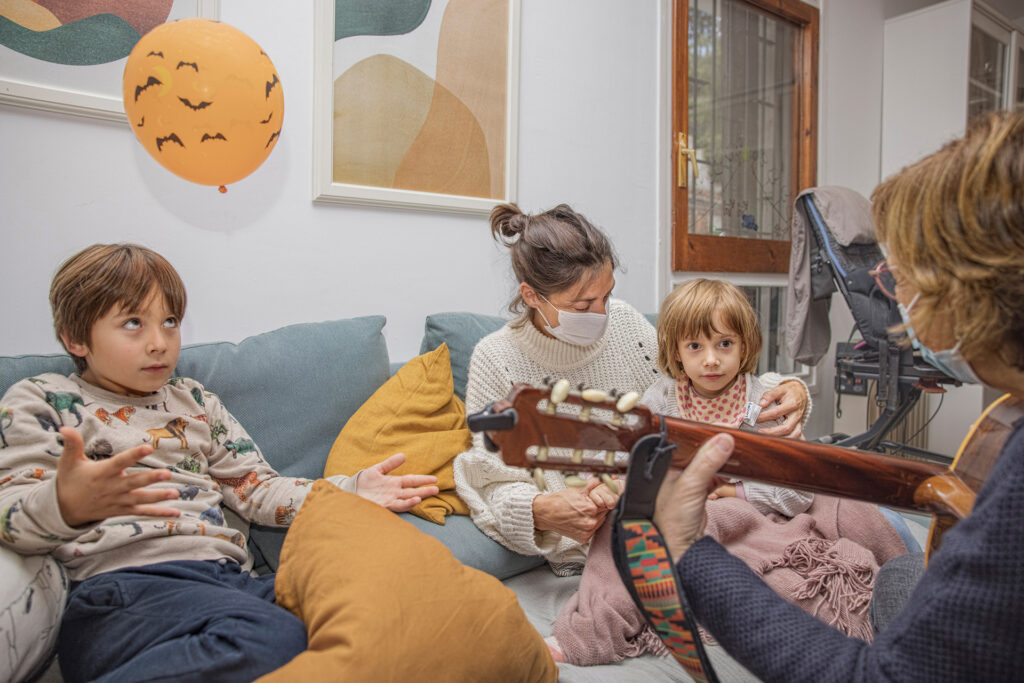
Laia, age four, has an advanced stage neurodegenerative disease. She can’t talk and has little mobility, which is why the Palliative and Chronic Pediatric Unit at Sant Joan de Déu in Barcelona thought she was a suitable patient for music therapy. Every two weeks, together with her mother, Carol, and her brother Lluc, Laia receives a visit from Núria, a music therapist, as part of the home music therapy service offered by the hospital.
“Music stimulates the skills she had that she has now lost so that, in some way, it is promoting her well-being. Sometimes she is in a lot of pain and music helps alleviate these phases of acute pain.” Núria Bonet, music therapist and founder of Associació Ressò de Musicoteràpia.
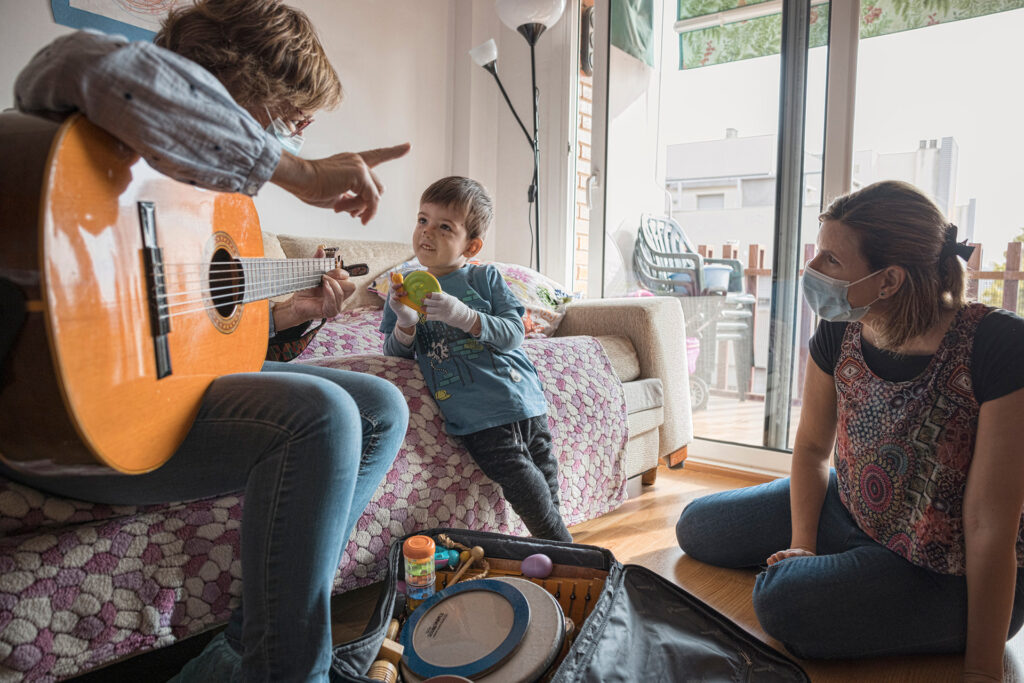
In his free time and when the hotel has a low patient occupancy, Dr. Gorrín plays piano at the Ayre Gran Hotel Colón, which was medicalized during the peak months of the pandemic after the health care system collapsed due to the need to care for COVID patients. Sometimes Dr. Gorrín sets up a loudspeaker so the patients can hear him in their rooms.
On March 19, 202, in just 24 hours, Gregorio Marañón Hospital’s professionals turned the Ayre Gran Hotel Colón into a new healthcare facility and provided it with the necessary staff and resources to operate as an additional Pavilion of its own healthcare center in order to tackle the pandemic.
Over 2,000 patients infected with the coronavirus have been treated there. It was the first healthcare facility of its kind to be set up in Spain, and the last to close on June 4, 2021.
“Now we are working along the lines of encouraging him and giving him strength. When he realizes he can’t do something, he gets nervous and doesn’t want to try. That’s why it’s a very important step that he has agreed to do the music sessions because it means he thinks he is capable, and this is very beneficial for him.”
Núria Bonet, music therapist and founder of Associació Ressò de Musicoteràpia, who visits Marc every two weeks as part of the home music therapy service offered by Sant Joan de Déu in Barcelona to its pediatric patients.
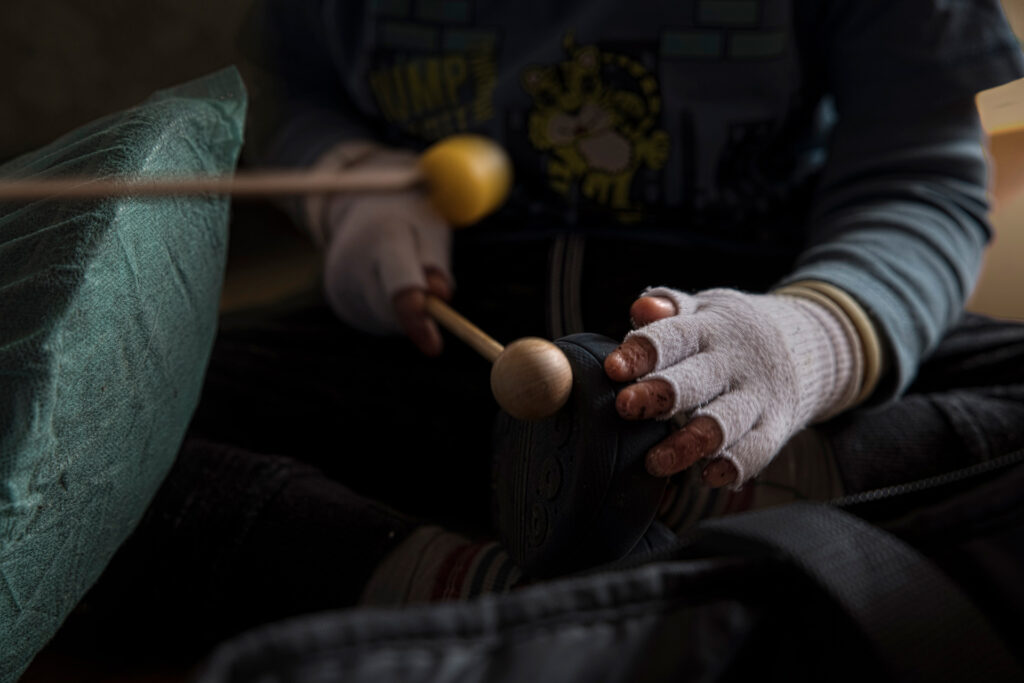
Marti, who is two and a half years old, suffers from epidermolysis bullosa, a skin disease that makes it harder to develop gross motor skills. Because these patients require special conditions of isolation and hygiene, Martí is unable to go to school and has very few interactions with others. At the Palliative and Chronic Pediatric Unit at Sant Joan de Déu in Barcelona, they thought that offering him music therapy at home would help him, so that he could receive different stimuli from those available at home. The program consists of fifteen sessions, at the rate of one session a week. Although his gross motor skills are limited (he only started walking a week ago), Martí’s fine motor skills are perfect, and he is very skilled at using his hands.
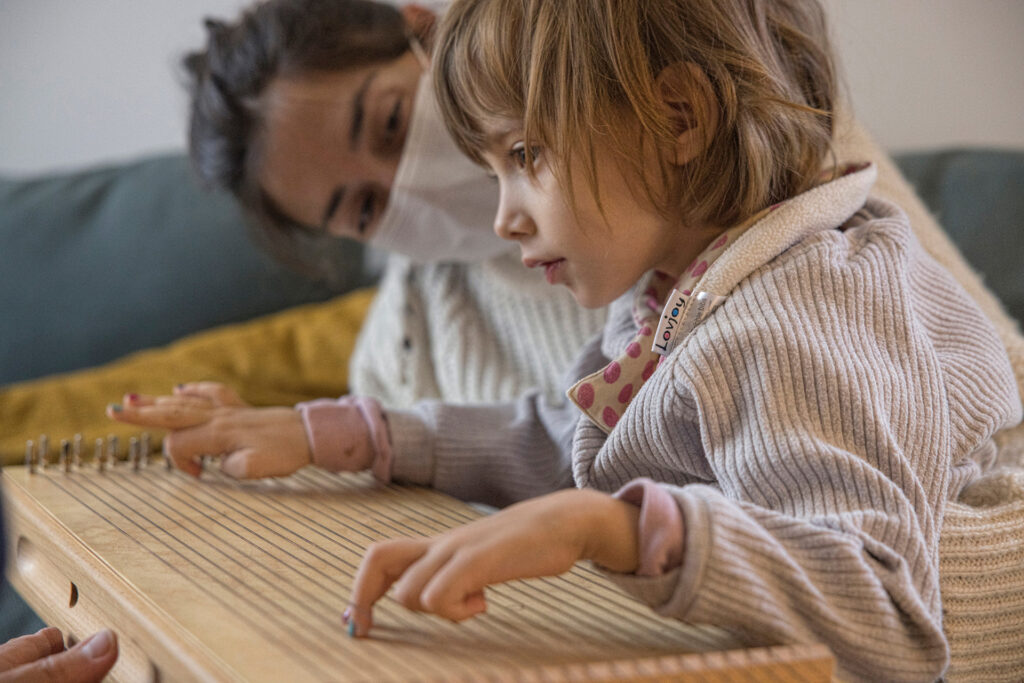
Laia, age four, has an advanced stage neurodegenerative disease. She can’t talk and has little mobility, which is why the Palliative and Chronic Pediatric Unit at Sant Joan de Déu in Barcelona thought she was a suitable patient for music therapy. Every two weeks, together with her mother, Carol, and her brother Lluc, Laia receives a visit from Núria, a music therapist, as part of the home music therapy service offered by the hospital.
“Music stimulates the skills she had that she has now lost so that, in some way, it is promoting her well-being. Sometimes she is in a lot of pain and music helps alleviate these phases of acute pain.” Núria Bonet, music therapist and founder of Associació Ressò de Musicoteràpia.
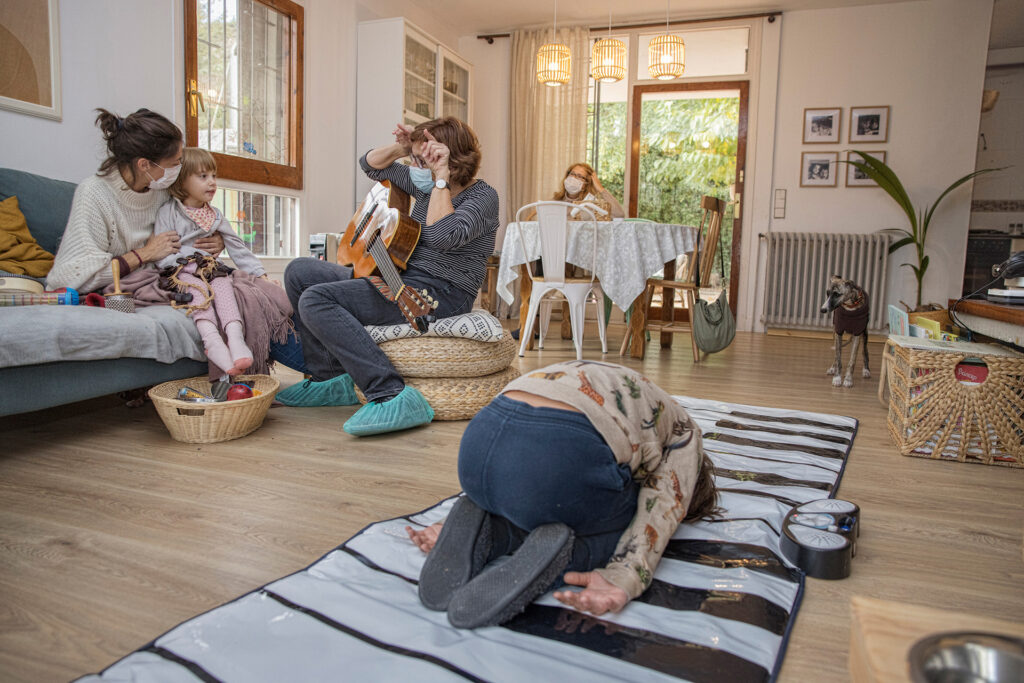
Laia, age four, has an advanced stage neurodegenerative disease. She can’t talk and has little mobility, which is why the Palliative and Chronic Pediatric Unit at Sant Joan de Déu in Barcelona thought she was a suitable patient for music therapy. Every two weeks, together with her mother, Carol, and her brother Lluc, Laia receives a visit from Núria, a music therapist, as part of the home music therapy service offered by the hospital.
“Music stimulates the skills she had that she has now lost so that, in some way, it is promoting her well-being. Sometimes she is in a lot of pain and music helps alleviate these phases of acute pain.” Núria Bonet, music therapist and founder of Associació Ressò de Musicoteràpia.
El País Semanal – La receta del arte. April 2022
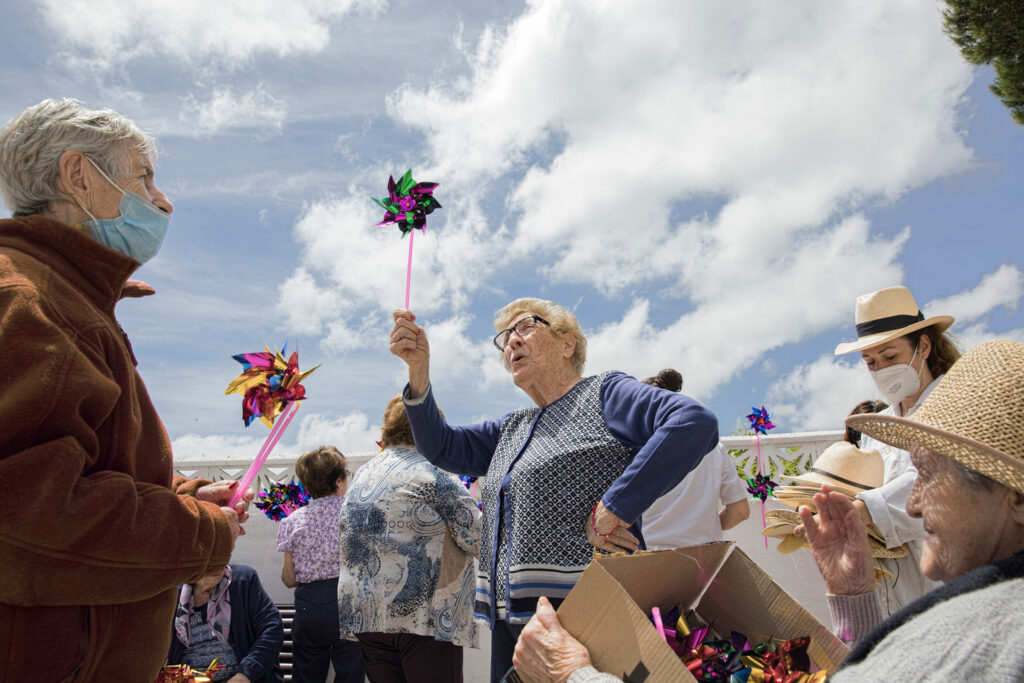
Teresa Lluzar, user of the Day Center at the Teulada-Moraira the Association of Families of People with Alzheimer’s, enjoys singing and dancing during the activity organized by psycho-expressive therapist Alicia Costa, who visits the center once a week. The activity is part of the multidisciplinary psycho-expressive art therapy program developed by cuidArt for Dénia Hospital in collaboration with this center.
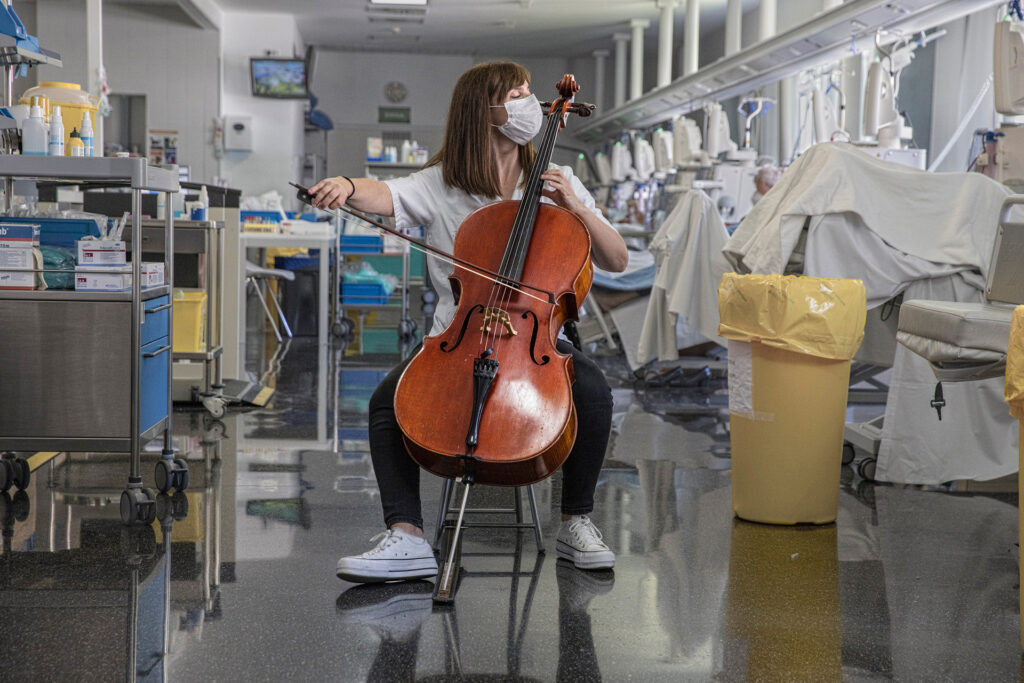
Isabel Bellver plays the cello every Monday for patients at the Hemodialysis Unit of Dénia Hospital. Music therapy uses music and sound to meet patients’ physical, emotional, cognitive, and social needs. By using music in the therapeutic context, the patient’s skills are strengthened.
“It was really touching and a huge rush after the scare I had this morning. It was impressive. It was an unforgettable experience and really impressed my family and friends when I told them about it. It was really very nice.”
José Ramón Serrano Prieto, ICU patient at La Salud Hospital in Valencia.
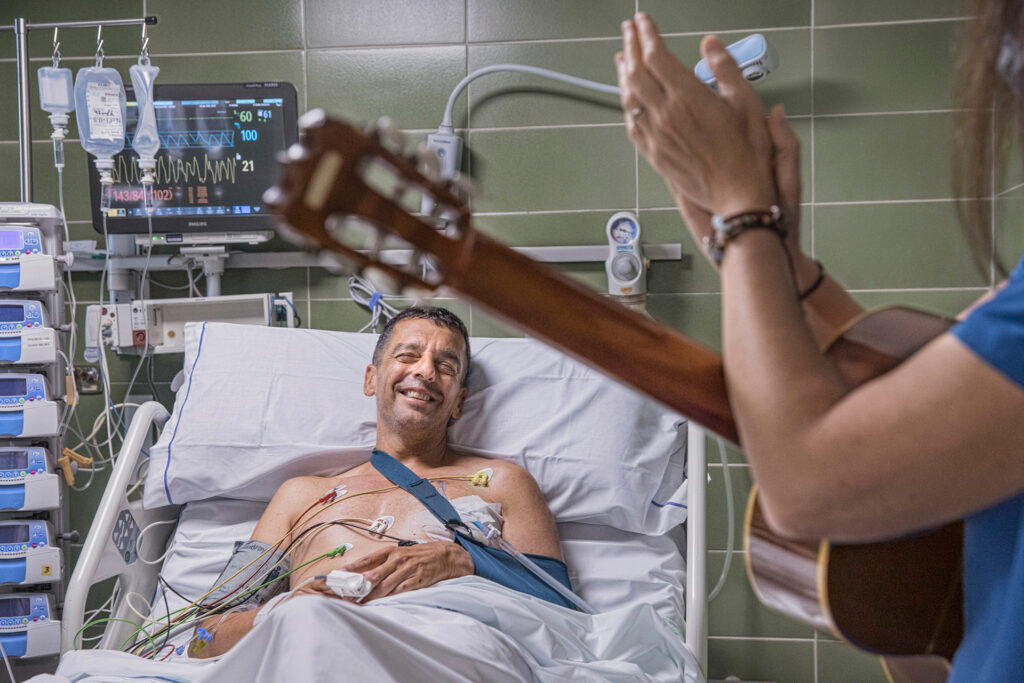
Gabriela Castillo, Argentinean artist who is collaborating with Músicos por la Salud. Today she’s playing her guitar for the intensive care patients at La Salud Hospital in Valencia. José Ramón Serrano, age 55, was admitted to the ICU a few hours ago after a bad fall while riding a bicycle. He has five broken and displaced ribs, a pneumothorax, and a level four dislocation of the clavicle.
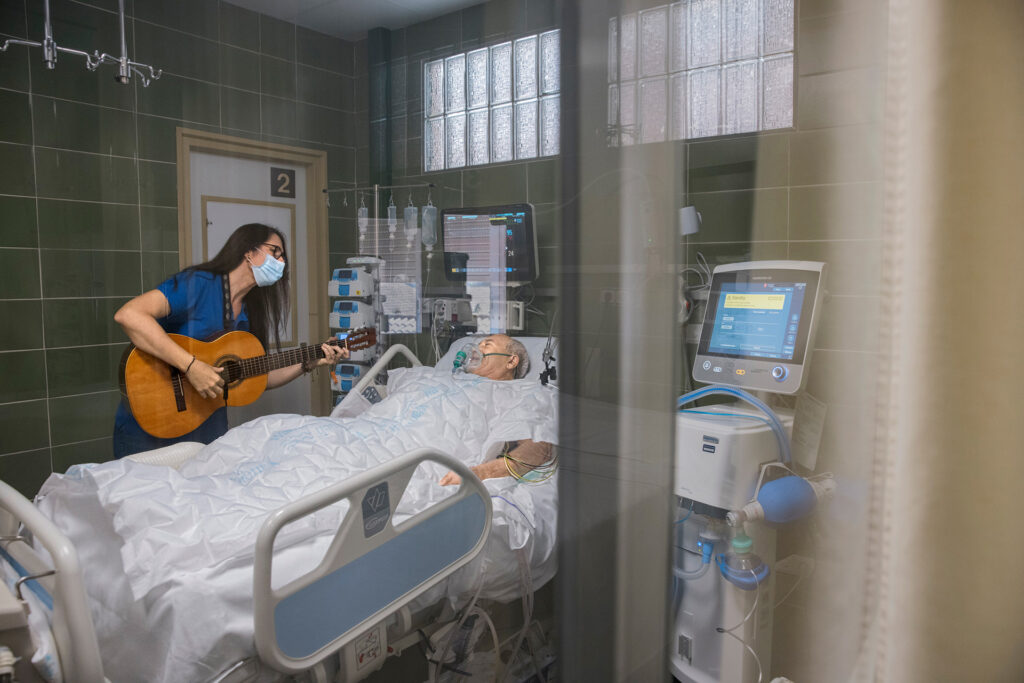
Regino Cuenca Jimenez, admitted to the Intensive Care Unit at La Salud Hospital in Valencia, listens to the boleros dedicated to him by Argentinean performer Gabriela Castillo. His vital signs actually improve during those minutes.
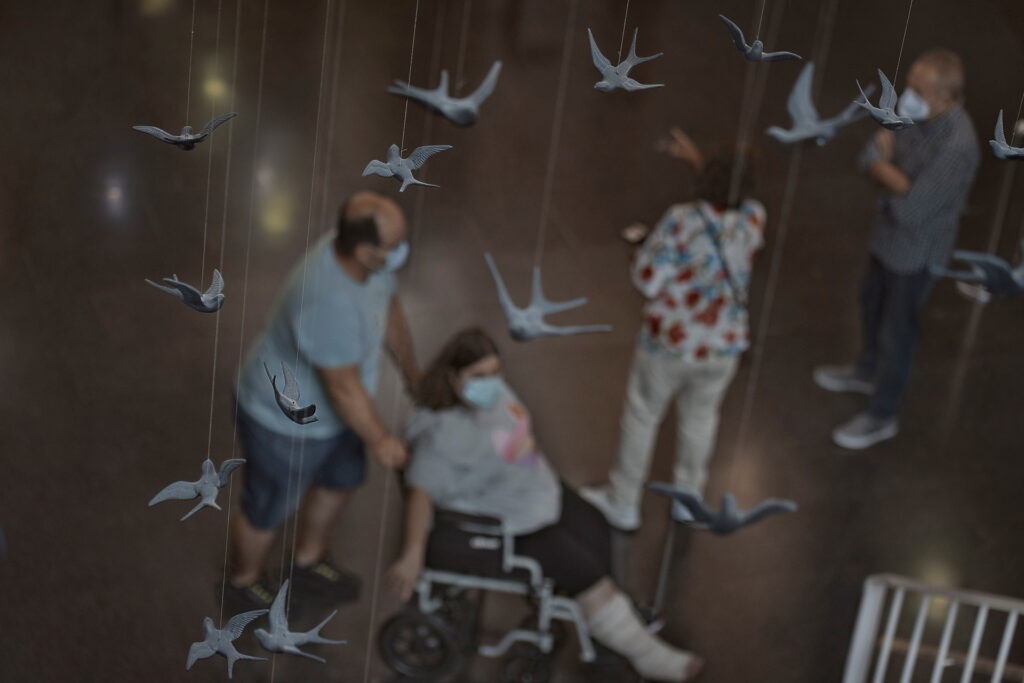
Pamen Pereira is the author of the art installation “DNA: The Orders of Love,” a symbol of the molecule that contains genetic information in any living being and created specifically for this space that connects two floors of Dénia Hospital.
The cuidArt project chooses works that invite viewers, who have had to go to the hospital, to reflect and take an optimistic approach, so they are distracted for a little while, relieving symptoms of anxiety, pessimism, and frustration.
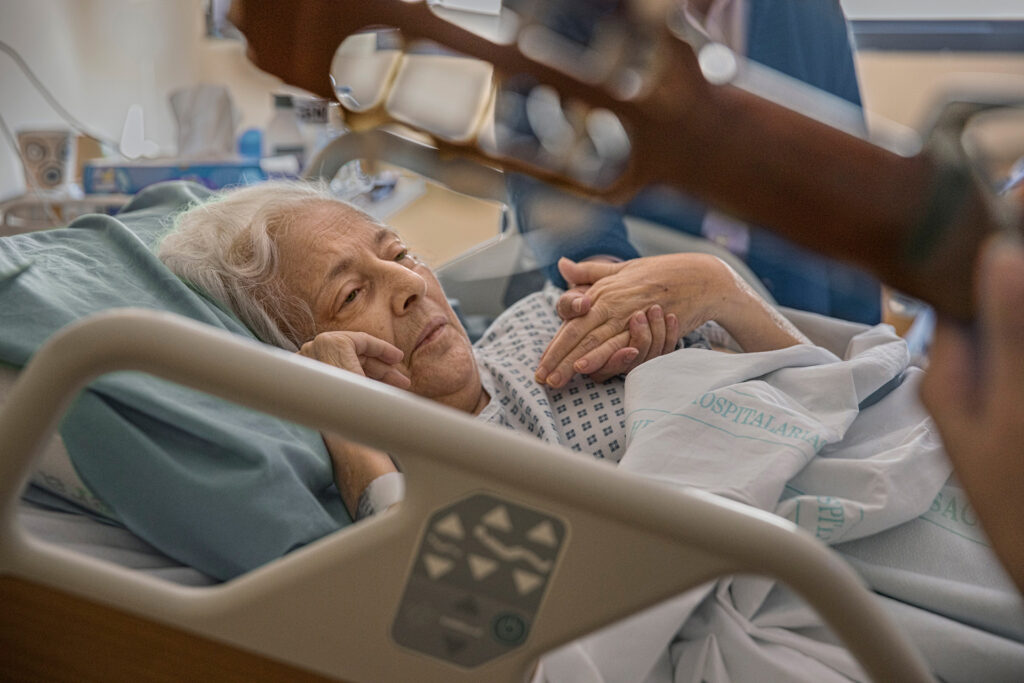
Katia Márquez, plays her guitar for Jovana Rankovic, a patient in the Palliative Care Unit at Beata María Ana Hospital in Madrid.
“Music has always been a part of me, it filled me with life when darkness was all around me.” Music is a lifeline that has sustained my every emotion, it’s made me grow and believe that anything was possible. That is why working to make music for people who are sick is the most beautiful opportunity life has offered me, because I know, from my own experience, that music can be healing.” Katía Márquez, artist collaborating with Fundación Músicos por la Salud.
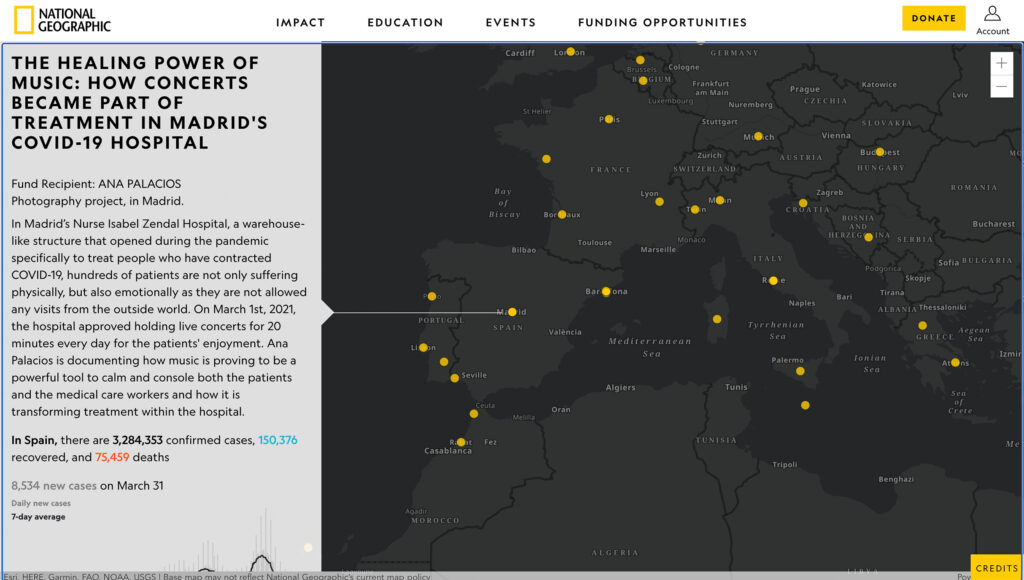
National Geographic
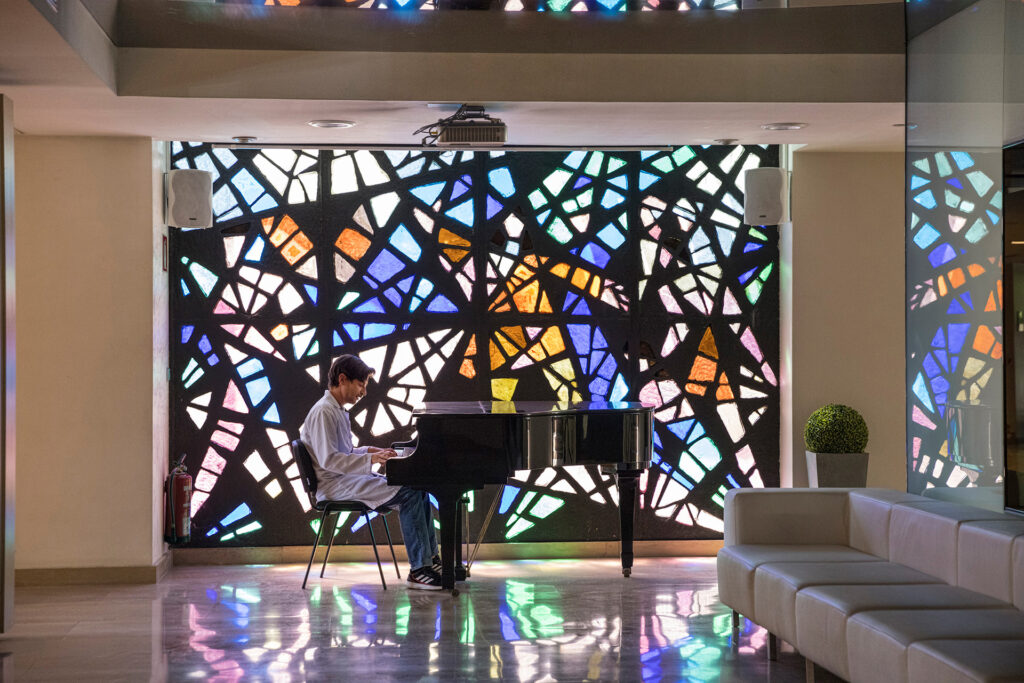
In his free time and when the hotel has a low patient occupancy, Dr. Gorrín plays piano at the Ayre Gran Hotel Colón, which was medicalized during the peak months of the pandemic after the health care system collapsed due to the need to care for COVID patients. Sometimes Dr. Gorrín sets up a loudspeaker so the patients can hear him in their rooms.
On March 19, 202, in just 24 hours, Gregorio Marañón Hospital’s professionals turned the Ayre Gran Hotel Colón into a new healthcare facility and provided it with the necessary staff and resources to operate as an additional Pavilion of its own healthcare center in order to tackle the pandemic.
Over 2,000 patients infected with the coronavirus have been treated there. It was the first healthcare facility of its kind to be set up in Spain, and the last to close on June 4, 2021.